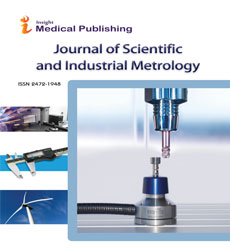Abstract
Monitoring of Development of Certified Reference Material of Biodiesel by High Field NMR Spectroscopic Techniques
Analytical strategies based on Nuclear Magnetic Resonance (NMR) (500 MHz and 800 MHz) spectroscopic techniques (1H, 13C, 13C-DEPT) have been presented for monitoring the development of Certified Reference Material (CRM) of biodiesel meeting ASTM D 6751/EN 14214 specifications. The protocol includes the analyses of feedstocks of oil and biodiesel, and impurities generated during transesterification reaction by NMR methods duly validated by standard methods based on GC-MS. The quality parameters such as contents of ester (B100), linolenic acid (C18:3), poly unsaturated fatty acids (PUFA), residual acyl glycerides (mono, di, tri), free glycerin and fatty acid profile, and iodine values have been determined directly by newly developed methods based on NMR techniques in samples of biodiesel produced by transesterification reaction of soybean, sunflower, cotton, canola and corn (maize) oils drawn at different interval of times. The systematic 1H and 13C NMR spectral interpretation has revealed the presence of five types of residual glycerides (AGs) namely 1 or 2 mono glycerides (1-MG, 2-MG); 1,2 and 1,3 di glycerides (1,2-DG; 1,3-DG) and tri glyceride (1,2,3-TG) in the biodiesel as well as transesterified products independent of types and nature of vegetable oils. The spectral analyses of samples at 800 MHz NMR instrument has provided enhanced sensitivity and resolution of signals of interest, which enabled identification of very low levels of various AGs. The repeatability of standard Deviation (%SD) of quality parameters show that the NMR methods provide results with acceptable precision. The accurate and rapid profiling of residual impurities generated during transesterification reaction without any further chemical treatment will be an effective guide for the catalyst developer for the syntheses of novel catalysts required for quality control of biodiesel. A rapid and convenient approach has been described for the analyses and quantification of bound and free glycerin in the biodiesel and transesterified products, which will enable rapid quality assessment and certification of CRMs.
Author(s):
Amarjit S Sarpal*, Paulo R M. Silva, Thays V Monteiro, Mauricio Fonseca, Valnei S Cunha and Romeu J Daroda
Abstract | Full-Text | PDF
Share this

Abstracted/Indexed in
- Google Scholar
- Directory of Research Journal Indexing (DRJI)
- WorldCat
- Secret Search Engine Labs
Open Access Journals
- Aquaculture & Veterinary Science
- Chemistry & Chemical Sciences
- Clinical Sciences
- Engineering
- General Science
- Genetics & Molecular Biology
- Health Care & Nursing
- Immunology & Microbiology
- Materials Science
- Mathematics & Physics
- Medical Sciences
- Neurology & Psychiatry
- Oncology & Cancer Science
- Pharmaceutical Sciences
